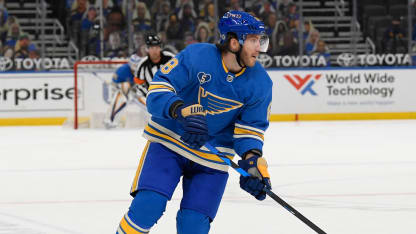Dissecting the Canadiens' Free Agency moves
Special contributor Marc Dumont takes a deeper look at the newest Habs who signed on the dotted line as UFAs

© Scott Rovak/Getty Images
Not only did they require a significant dose of defensive acumen in the lineup, but they also needed to bolster their forward depth and add more scoring punch to the mix.
Oh, and they needed to do it while keeping a close eye on the salary cap, which is expected to remain flat for the foreseeable future, all the while navigating negotiations powered by players looking to maximize their value.
Sounds easy, right?
Teams aren't built solely through free agency; you need a healthy mix of drafted and traded players as well, but it is possible to add quality elements to the roster if the price is right, which was the case for the Canadiens this July.
In total, they added five bona fide NHL players to the roster, spending a little under 10.6 million dollars to fill several key roles in the process.
David Savard arrives in Montreal with a brand new four-year contract in his pocket and plenty of opportunities to prove his worth. The steady, physical defenseman will bring a lot to the table, owing to his defensive prowess and history of providing a significant amount of offense from the back end. Pending his usage by head coach Dominique Ducharme, we probably shouldn't expect Savard to match his career-high of 11 goals, scored back in 2014-15 with the Blue Jackets, but if he does manage to make his way onto the power play, Savard should be able to help increase the number of shooting and scoring opportunities generated by the team.
Again I say - a behind the net feed from DAVID SAVARD #chefkissesfingers pic.twitter.com/mGQkWyCUEW
— Alison (@AlisonL) March 9, 2020
However, his real value, beyond his stalwart defensive work on the penalty kill, will be his ability to absorb a healthy dose of minutes at 5-on-5. Savard, whose underlying numbers improved exponentially once he joined the Tampa Bay Lightning, can easily play upwards of 20 minutes per game with very little fanfare, which is essentially a coach's dream.
With defensemen valued at a premium in the current free agency market, Savard's $3.5M AAV should be of little-to-no concern when weighed against his overall impact, making him a very reasonable signing at a time when reasonable signings are few and far between.
On the topic of good value signings, the Canadiens also decided to roll the dice on a player who led all KHL defensemen in scoring last season: Chris Wideman.
Wideman, who played last season with the Nizhny Novgorod Torpedo, finished third on his team in scoring, with 9 goals and 32 assists in 49 games.
It's impossible to predict exactly how much offense he can provide from the back end next season, but if we use NHL Equivalence -- an algorithm to help estimate how many points would transfer from one particular league to another -- we discover that his NHL Equivalence in points based on his last season is an impressive 46-point pace over an 82-game schedule.
Six of his goals came on the power play, where he should find himself logging heavy minutes regularly, but that doesn't mean he can't contribute during even-strength play. Wideman played almost 22 minutes per night for Nizhny Novgorod, the high mark among all players on the team. He also took 172 shots on net, once again far and away the best result among his team's blue-liners. Only one forward managed to beat Wideman's 2.9 shots-per-game average, which connotes opposing goalies should be on high alert whenever Wideman has the puck.
Regular season points leader among defensmen @Chris_Wideman 🇺🇸 fires his cannon for first #GagarinCup Playoffs goal! pic.twitter.com/o4SST91gYz
— KHL (@khl_eng) March 4, 2021
He probably won't see the same amount of ice time and opportunities as he did in the KHL, but given his $750,000 salary, there's little doubt that he has the potential to become one of the best value defensemen on the roster, particularly if he finds his rhythm on the power play.
Among forwards, newcomer Cedric Paquette should provide Wideman with a little competition when it comes to the best value contract in the lineup. Paquette is a feisty forward, and by feisty, I mean he's the kind of guy who drives opponents up the wall on a regular basis. While his opponents quickly forget about playing hockey and consider how to respond to his annoyingly efficient style of play, Paquette has an uncanny ability to generate a surprising amount of offense from the bottom six.
We got a line brawl in Vancouver after Cedric Paquette lays a big hit on Elias Pettersson 👊 pic.twitter.com/OIqMMJkRs9
— Kliff’s Bedroom (@KliffsBedroom) December 19, 2018
He's perfect for the fourth line, but can jump up the lineup if required to do so because he's the type of player that coaches can trust every single shift, including on the penalty kill.
Whenever Paquette was on the ice for the Hurricanes last season, the team controlled almost 54 percent of the shots, 55 percent of the scoring chances and 57 percent of the expected goals. Not to mention, they also controlled almost 58 percent of the high-danger chances.
He's also one of the most active hitters in the League, which can be a red flag for bottom-six players. Some players simply go around hitting players long after the puck has been cleared from the offensive zone. Those players tend to have great hit totals but very poor underlying numbers. But Paquette maintains strong underlying numbers in addition to laying a ridiculous number of hits, which should fit in nicely with the Canadiens' hard-working, team-first mentality.
Tweet from @HockeyHoundShow: #CBJ Seth Jones gets absolutely leveled by newly acquired #LetsGoCanes Cedric Paquette pic.twitter.com/TzqRkHRJ1e
Simply put, Paquette should be a fantastic depth piece for the Canadiens, one that can easily provide great value when you consider his $950,000 salary cap hit.
The same can be said about Mathieu Perreault, the veteran winger who also signed a one-year, $950,000 contract. He's what we call an 'analytics darling," a player who provides fantastic underlying numbers regardless of the situation. What's more, Perreault can not only drive the play at 5-on-5, but also produce a very respectable number of points in the process.
Despite only playing an average of 9:53 at 5-on-5 last season, Perreault finished the year with 14 points, which was significantly more than most bottom-six Canadiens players.
And finally, the final piece of the free agency puzzle is none other than certified goal-scorer Mike Hoffman. Hoffman, who signed a three-year deal to the tune of $4.5 million per season, has an established track record of scoring an abundance of goals regardless of which team he's playing for. If we prorate his production to an 82-game season, Hoffman has averaged a little over 28 goals per season throughout his 545-game NHL career.
He should provide quite the boon to the power play, seeing as a significant number of his goals have come with the man advantage. More precisely, 67 of his 189 career goals have taken place on the power play.
His underlying numbers at 5-on-5 took a hit during his one-season stint with the St. Louis Blues, but throughout his career, Hoffman has managed to provide above-average possession numbers when it comes to controlling shots and high-danger scoring opportunities.
He also provides much-needed pure shooting talent, relying on accuracy and his quick release to fool goaltenders rather than a high volume of shots. All things considered, his $4.5 million price tag should be incredibly easy to justify once fans get a taste of what the sniper brings to the table.
We got two snipers in the building: the blue line and Mike Hoffman 💣#stlblues pic.twitter.com/p6HdzJ6sJs
— The Chirp (@STLBluesChirp) February 3, 2021
Now here comes the exciting part.
Yes, the Canadiens added several big pieces, which means they also lost a few key players, most notably Phillip Danault and Corey Perry. They won't be easy to replace, but with every change comes opportunity, and for the younger players on the roster, particularly Nick Suzuki and Jesperi Kotkaniemi, the opportunities will be plentiful.
The biggest challenge will be providing the same type of defensive awareness provided by Danault in previous years, all the while generating the type of offense that's expected from a center playing big minutes in the top six.
With the free agency additions alleviating some of the pressure, it should be an ideal opportunity for the youth movement to take the next big step in their careers.
(All Statistics provided by NaturalStatTrick.com)


















